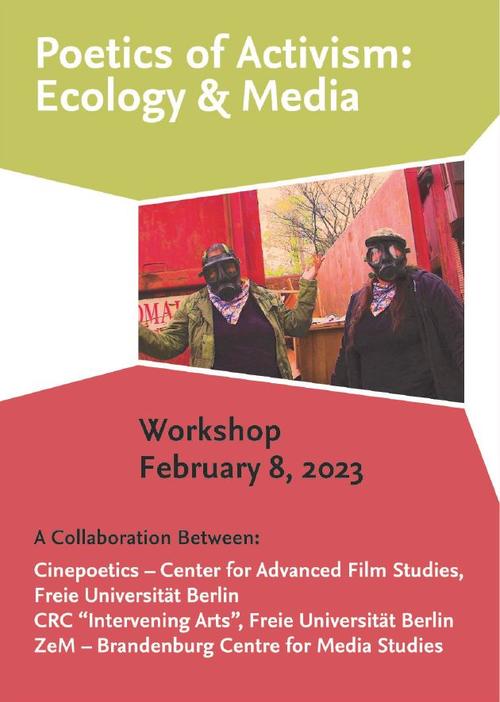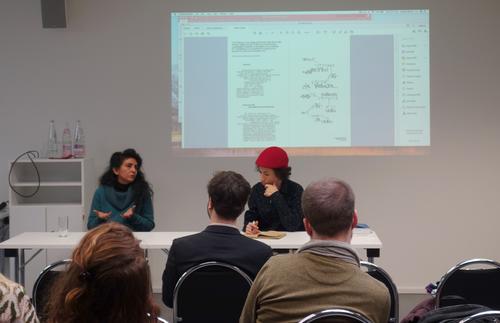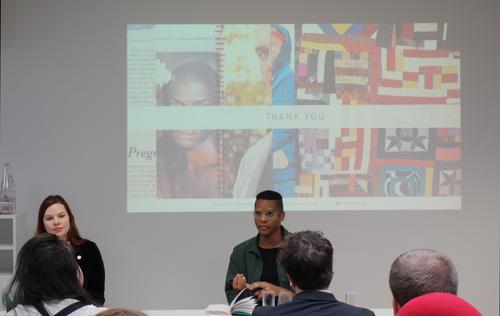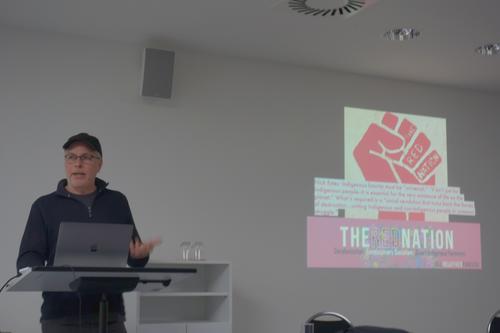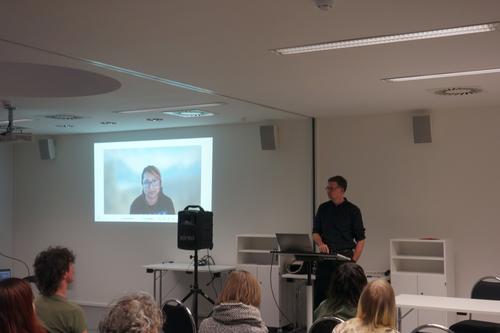Poetics of Activism: Ecology & Media
08.02.2023 | Workshop by the Cinepoetics group with in collaboration with SFB 1512 "Intervening Arts" (Freie Universität Berlin) and the Brandenburg Center for Media Studies.
Research Focus: Audiovisual Cultures II: Phenomenology of the Anthropocene
The workshop began in the morning with a short welcome by Matthias Grotkopp who introduced the cooperating organizers, the multiple formats of presentation and conversation as well as the workshop’s program. He then laid out theoretical relations between the fields of activism, art and research as three modes of world-making.
In her presentation, “Sounding the Quintessential: Environmental Science + Community Engagement + Art Tech,” Nandita Kumar contextualized her art in regard to her experience of living more and more disconnected from ecology. Subsequently, she presented three different art projects. OsmoScape is a graphical notation score constructed out of water related data. The visual and sonic data visualization is accessible via a Web-App that is not interested in linear information dispersion. In her exhibition The Unwanted Ecology, she investigated medical weeds from the western ghats. Different plants were converted to frequencies which together with white noise and field recordings formed artificial plants as sonic objects. In her third project, a book and an exhibition, misinformation and manipulative facts make up a score that is then turned into Code as well as Haikus.
The presentation was followed by a conversation with Layla Zami that revolved around questions of unpredictability, working with data and solutions for the future. Kumar expanded on her her interest in how information travels, the challenge of reaching a larger audience as well as the inherent activism of creating something beautiful.
In the second presentation of the day, “Offbeat Patterns: Uncertainty and Antifragile Technologies,“ Romi Ron Morrison connected their background in cartography to quantification practices and cybernetic models of information flows. This comprises a history of the present that releases itself from past constructions. Specifically, they asked how enduring a proximity to uncertainty feels like. Following on this, Morrison analyzed the imaginaries of applied logic models how to determine threats that were transferred from military to municipal use. Furthermore, they explored concepts of queer temporality and turned towards textures and Black quilt-making. Morrison presented their own art of remaking quilts using newspapers, fabrics, but also field recordings as reflections on one’s own practices of protection. Finally, Morrison asked about often forgotten things that need to be carried with us. Their art project Future Conditional was thus presented in a move from prediction to a relationship to uncertainty.
Connecting with the previous talk, TJ Demos’ ”Cinepoetics of the Racial Capitalocene” analyzed notions of future uncertainties, although within the context of both indigenous and afro-futuristic aesthetics. Taking the film RECLAMATION (2018) from T.J Cuthand as his first example, Demos argued for an intentional absence of white bodies in the presented futurist landscapes that directly confront white spectators with their own disappearance. Consequently, the second film example INFINITY MINUS INFINITY (2019) by The Otolith Group expands on this dynamic by reappropriating historical white canonized theories like quantum dynamics or African diaspora studies and recontextualizing them into an own film language. For Demos, both films raise a critique against the hegemonic notion of quantified certainty created by techno-capitalism – and, rather, positions racialized bodies in the foreground, in an act that permits these communities to reimagine futures of being-present.
After the lunch break, the workshop continued with a talk between Jan Lukas Krüsemann and Matthias Grotkopp, which centered mainly on Krüsemanns participation in the activist group SCIENTIST REBELLION. The conversation started by addressing the affective impact that data accumulation about global warming can have, specially related to negative emotions like despair or fear, and how activism can be viewed as a personal decision to fight against them. Later, to the central inquiry about the optimal way of taking action Krüsemann stressed that this is still an open question that has to be reflected on the daily praxis in a trial-and-error approach to activism. This approach has a long history and the work of previous groups facilitate today's activism by setting the basis for legal training and emotional support between members. At the same time, it has also led groups to experiment with a great deal of methods to gain attention, one specific mentioned was the theater play LAMENTO ÜBER UNSER ALLER NOT (2022) produced by a group’s member and performed in Oldenburg. At the end of the conversation and aiming to end on a positive note, Krüsemann motivated the participants to integrate as much activism as possible in their daily life contexts, from work to home, to raise awareness about the upcoming crisis.
In the last presentation of the workshop, "Varieties of impact: Strategic and tactical forms of engaged film practice," Naima Alam and Jens Eder talked about the aim of engaged film practice for social impact. They argued for integrating different strands of film studies research regarding the connection of impact and poetics as well as insights from other disciplines and practice-led research in order to grasp the complexities of impact processes. They distinguished several stages towards impact and subsequently differentiated between strategic and tactical film practice. As an example for the former Naima Alam presented a case study about the MEENA Communication Initiative (1991), an animation series created by the cooperation between UNICEF, Hanna-Barbara-Studios, artists from India, Pakistan, Nepal and Bangladesh as well as audiences from rural parts of South Asia. MCI was a strategic approach to improve the perception of women in SAARC countries and had a long standing impact. As an example for tactical film practice Jens Eder presented the case of the observational documentary EINE DEUTSCHE PARTEI (Simon Brückner, 2022) about the German right-wing party AfD and the film’s distribution and impact tactics. He described a dilemma of the obversational form as precondition for production and creative aims, but an obstacle for distribution and reach. In conclusion they argued for embracing the variety of cinematic forms, strategies, tactics regarding cinematic impact.
